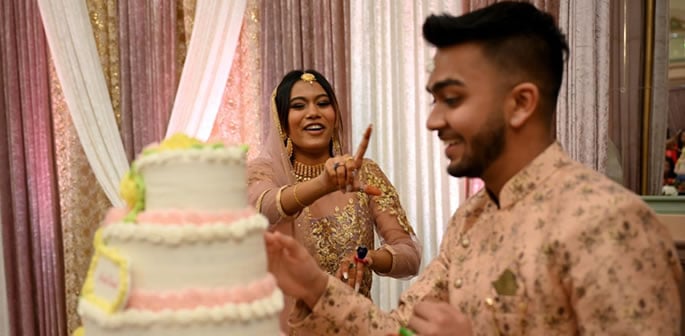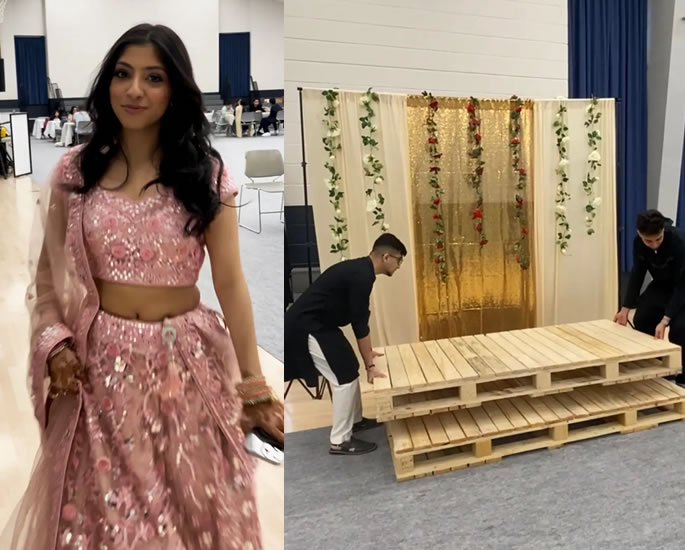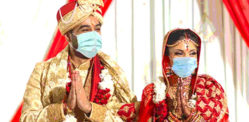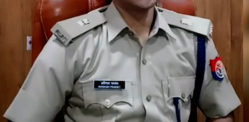“It’s kind of a euphoric moment.”
There is a growing trend of South Asian students at US universities holding pretend weddings, known as a mock shaadi.
One ‘couple’ was Bilal Nasir and Samar Iqbal.
On March 3, 2023, Bilal rode to the venue (Low Library at Columbia University) on a bejewelled white horse, wearing a golden sherwani.
Meanwhile, Samar was dressed in a traditional gharara and dupatta. Silver jewellery adorned her wrists and forehead as she entered the venue.
In a Shakespearean twist, he was a boy from New York University and she was a girl from Columbia.
When Bilal, then a graduate student, learned that the Pakistani Student Association was hosting a joint mock shaadi with Columbia University and that he had been nominated to play the groom, he was ecstatic.
Bilal said: “Most people only get married once. I had the chance to practice.”
It was the association’s largest event of the semester, with students who had never been involved with the school’s South Asian college groups turning up in droves.
Bilal said he had never had the chance to see his own culture celebrated.
He said: “I look to my left, and I see my desi friends having fun and listening to this music, which I expect; then I look to my right, and I see all my white friends from school who don’t understand this music, but they’re having the same amount of fun.
“It’s kind of a euphoric moment.”
At various North American universities, South Asians are joining in on the mock shaadi trend.
The likes of the University of Texas, Stanford and the University of Toronto Scarborough are hosting pretend weddings.
At Stanford, the event featured not one but four pretend couples.
Through the Bengali Student Association at the New York Institute of Technology, Sumayyah Muhit helped organise a mock shaadi.
The event took place on February 15 and saw almost 500 attendees.
Sumayyah said: “Everyone at our school seemed to be excited for it.”
Throughout the event, the club’s executives stopped to explain the customs.
Sumayyah said she enjoyed the opportunity to share Bengali traditions, like gate-holding at the door to playfully block the groom’s entrance and a day-after ceremony from her home region of Sylhet in Bangladesh, in which the bride comes home and cuts fish.
She added: “So many people who attended the wedding had no idea where Bangladesh was, or that it was even a country in Asia.”
According to Rijuta Mehta, an assistant professor at the University of Toronto specialising in post-colonial studies, pop culture has played a major role in creating demand for these events.
Bollywood films, reality TV shows and magazine spreads all contribute.
Many universities hosting mock shaadis are hoping to make them an annual affair.
But as the trend gains momentum, it can sometimes be met with disbelief.
Neil Malur, a co-president of the South Asian Association of Students at MIT, said:
“It does sound a little ridiculous at first. It’s like, a mock wedding? Why would we be hosting a mock wedding at our school?”
The idea began to circulate among students in the association after they noticed other universities participating.
Neil explained: “We sort of dropped it as a joke to a lot of our members, and then we received hugely positive community feedback.
“Everybody was so excited about it — they all just kept asking us when the mock shaadi was going to happen.”
For many South Asian students, the pretend wedding gives them a sense of belonging.
Dr Mehta said: “There seems to be this kind of obvious yearning for a home that is so distant, and this kind of cultural event that one seems to be kind of nostalgic for.”
Devanshi Mehta, a student at the University of California, has attended a mock wedding at UCLA over the past two years.
She said: “In college, when you’re thrust into this new environment, you want to bring pieces of familiarity with you, and a lot of that can sometimes stem from culture.
“It’s the opportunity to just be seen, and be heard, and be around people who feel like home.”
Dr Mehta noted that these events do not necessarily reflect the experiences of South Asian students from less privileged backgrounds, including those in South Asia who are unable to pursue higher education in North America.
They can create a false impression that solely associates South Asian culture with affluence, she said.
When Neil first heard of the mock shaadi trend, he did not know what a shaadi was, adding that many South Asian minority groups and their wedding traditions are not represented at mock shaadis.
The student group at MIT decided to hold off on hosting a mock shaadi until 2024.
Neil said: “We had to make sure that we held a shaadi in a way that was sensitive to diverse traditions of South Asia, which would involve a lot of planning.”
To make the mock shaadi as inclusive as possible, members of the association are working to connect with other student populations that aren’t as large on campus, including Bengali and Muslim South Asians.
Despite some of the mixed feelings, such pretend weddings inspire.
Aparna Kapadia, an associate professor of history at Williams College, said:
“Instead of thinking of the campus shaadi phenomenon in positive or negative terms.
“I would think of it in terms of the evolution of South Asian communities on American campuses.”































































